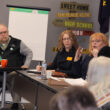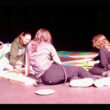Voters need to realize that voting no on the current library levy request will not result in the closure of the library.
The political action committee campaigning for the library levy, which would increase by nearly 70 percent, keeps suggesting that the library would close after the end of the fiscal year, June 30, if the levy fails. This is simply not true.
Here’s the deal. If the library levy fails on March 11, the city gets another stab at it before the end of the fiscal year. Granted, all of the library boosters working hard on the campaign will be tired from this election, and thusly it may be even more difficult to meet the 50-percent supermajority then.
If a new levy requests passes then, the doors to the library stay open on July 1.
Even failure on May 20 would not mean the library shuts down for the next fiscal year. If could be funded retroactively, after most likely closing its doors from July until another election in September. Then it would be funded through the life of the new levy, at worst closing for two and a half months.
Voters would do well to remember this as they mark their ballots. If the proposed increase was cause to mark the ballot “no” in November, nothing has changed. The council chose to submit exactly the same proposal to voters again.
Proponents of the increase may be working under a false illusion of hope for expanding the library’s service levels. Much of their campaign work rests on the belief that voters were simply unaware of how much the library has to offer, that being the main reason voters said no.
A majority of the persons in a survey indicated that they supported the library levy in November. The political action commitee wanted to find out why they voted no in November. Either surveyors are talking only to library supporters or some of those surveyed are lying about how they voted. In fact, the majority of voters said no in November. Surveyors only turned up two voters who admitted to voting no.
It’s possible that voters turned the levy down because they didn’t want to increase library funding by almost 70 percent. It’s possible voters knew exactly what they were doing. After all, in the past eight years, the library has no trouble passing a levy with large margins even as police and fire services have.
If this is the case, the council did a serious disservice to library patrons and supporters when it chose not to reduce the levy request. If voters knew what they were doing in November and voted the request down because the request was too large, they will do it again.
That will leave only one more attempt to pass a levy, with the inherent complication of reaching the 50-percent super majority requirement. With volunteer energy levels drained trying to pass the larger levy, passing a smaller levy in May may be inconceivable, and the “Save our Library” slogan may ring true after all.
Should this measure fail, the council should submit a lower levy request, perhaps one question maintaining current service levels along with an additional question requesting the proposed increases, giving voters the opportunity to decide whether to keep the library open without increasing service levels or to increase service levels.





